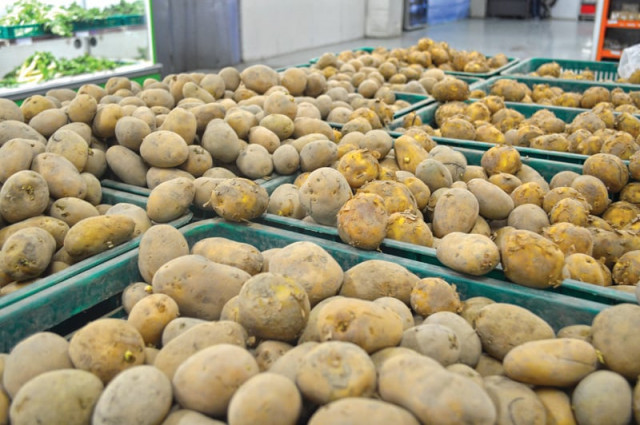ECC meeting: Govt scraps 25% regulatory duties on potato export
Decision based on predicted surplus production in coming year.

The federal government on Wednesday abolished 25% regulatory duties on export of potatoes, insisting that the improved domestic production of the commodity has ended the price problem in the country.
The decision, with effect from December 20, was taken by the Economic Coordination Committee (ECC) of the Cabinet, headed by Finance Minister Ishaq Dar. The ECC also approved a modified policy for establishment of on-site power plants aimed at bringing 1,000 megawatts of electricity in the system as short-term solution to the energy crisis.
The ECC abolished the duties and allowed export of the commodity on the recommendation of the Ministry of National Food Security and Research, which would pave the way for export of potatoes, according to a handout issued by the Ministry of Finance. The meeting was told that farmers had planted the crop on a 10% larger area this year and abundant yield was on the cards, surely creating a surplus.

However, there was no independent verification of the claim and decision is said to be taken to give benefits to growers at the expense of consumers. While lifting the duties, Dar directed to set up a committee comprising of the secretary of Commerce and the secretary of the National Food Security to closely monitor the market situation and keep the ECC regularly updated.
“Interest of local consumers has to be kept in view before any decision is made,” said the finance minister.
In May this year, the ECC had imposed a 25% regulatory duty on export of potatoes aimed at curbing soaring prices. It had also allowed import of the commodity by waiving off duties. At that time, the prices hovered around Rs90 per kilogramme.
According to the latest price bulletin of the Pakistan Bureau of Statistics, the potato prices remained in the range of Rs50 to Rs60 per kilogramme, depending on the market and the city. There are apprehensions that the price may increase when the growers start exporting.
On-site power plants
The ECC also approved the Ministry of Water and Power’s proposal regarding Modified Policy Framework for on-site private power projects based on interim gas supply with fresh amendments. The Ministry of Petroleum had sought amendments to the conditions on currency required to be quoted in the bids and enhancement in the period of the commercial operation day.
The on-site power generation of 1,000MW by using discovered gas which has not been injected into pipeline system is part of the government’s plan to increase power generation. The other two options are adding LNG-based power generation.
The Federal Board of Revenue made it clear that no new SRO will be issued to facilitate the on-site power projects, however, the investors may avail benefits under existing provisions.
Under the on-site policy, the power distribution companies have already advertised for 10 gas fields, indicated by the Ministry of Petroleum and Natural Resources, as sites for these projects.
The ECC also approved an agreement between Thermal Power Station Guddu and Engro for the use of 60mmcfd gas from the Mari shallow till December 2015. The body approved the public disclosure of the Pakistan Energy Sector Reform - Quarterly Progress Report of Development Policy Operations. The multilateral lending agencies are helping to develop the programme aimed at closely monitoring the sector’s performance.
The plan covers tariff management, improvement of sectorial performance, incentivising private sector participation and improvement of accountability and transparency. The Asian Development Bank is providing $20 million loan for this purpose.
ECC increases sugar export quota, gives subsidy
In another development, the ECC also approved the export of an increased quota of 650,000 tons of sugar till May 15, 2015 — up from the current level of 500,000 tons. The ECC was informed that there are ample stocks, amounting to 1,050,000 tons, available in the country — sufficient to meet domestic requirements at a consumption rate of 390,000 tons per month till March 15, 2015.
As sugar prices have plunged to Rs38 per kg in the world market, the government decided to give a subsidy of Rs10 per kg. The ECC allowed inland freight subsidy at Rs2 per kg and cash subsidy Rs8 per kg on its export. The total amount of subsidy would be Rs6.5 billion, which would be paid equally by the centre and provinces. The ECC also imposed 20% regulatory duty on the import of raw and beet sugar and fixed the minimum price for export to Afghanistan and Central Asian States at $450 per ton.
Published in The Express Tribune, December 25th, 2014.
Like Business on Facebook, follow @TribuneBiz on Twitter to stay informed and join in the conversation.


















COMMENTS
Comments are moderated and generally will be posted if they are on-topic and not abusive.
For more information, please see our Comments FAQ